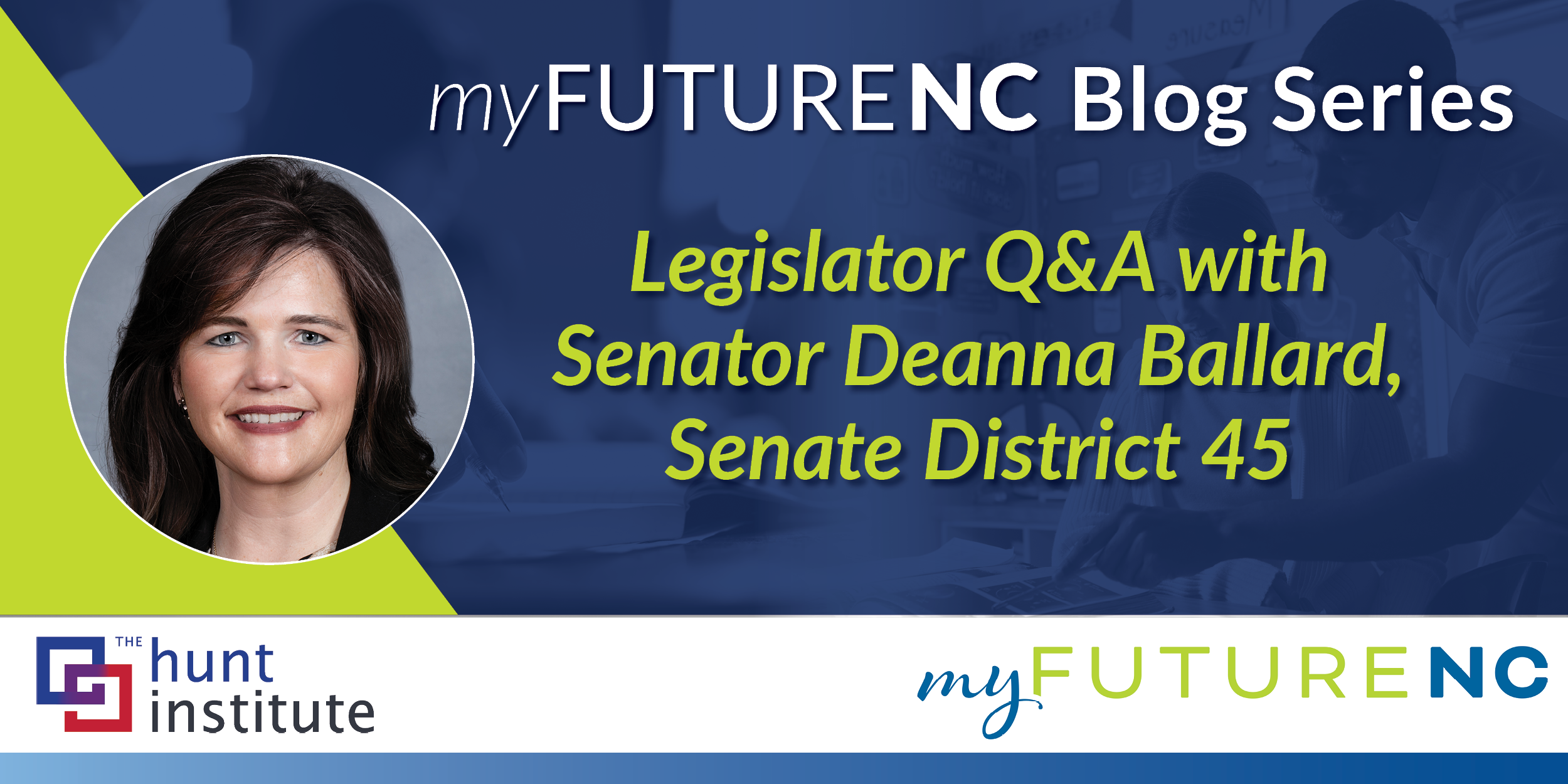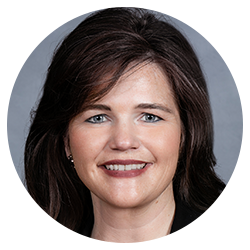

March 27, 2020

Communities across North Carolina are working hard to drive postsecondary attainment at the local level. We spoke with Senator Deanna Ballard of NC District 45 to learn more about how her home district of Alleghany, Ashe, Surry, Watauga, and Wilkes counties is working to achieve myfutureNC’s ambitious postsecondary attainment goal.
What do you see as the biggest challenges to increasing postsecondary attainment in your district?
One of the biggest challenges is the overall mindset that pursuing additional education beyond high school “just isn’t for” my constituents – many have been conditioned by society to believe the only valuable credentials come from four-year institutions. Overcoming this persistent misconception is an essential component of achieving myFutureNC’s ambitious goal.
I am a product of Lincoln County and the North Carolina Public School System, and truly believe that we can work together to produce a future that provides opportunity for of all of our students. North Carolinians of all ages and backgrounds can earn postsecondary degrees or credentials that will lead to sustainable and fulfilling careers, not just those coming directly from the K-12 sector. Both of my parents received postsecondary degrees or training as adults. My mom returned to school at UNC Charlotte at the age of 50 to earn her teaching degree, and my dad received on-the-job training as a logger to expand his skill base. Everyone needs to believe in the possibility of further education, for themselves and also for each and every member of their community.
Postsecondary attainment includes several options in addition to a four-year degree. How can North Carolina increase awareness of these different programs to target students and adults who feel like the four-year path isn’t right for them?
This is such a crucial element of North Carolina’s attainment goal. Four-year degree programs are an important avenue for postsecondary attainment, but not everyone wants to pursue that path. There are countless careers that are vital to our way of life that do not require a four-year degree and provide competitive wages.
The missing piece here is a lack of awareness, especially for high school and community college students who simply haven’t been exposed to prospective career pathways and the certificates or credentials they require. Career Days, when representatives from business and industry come into schools to talk about their careers, are where many schools start, but that can’t be where these conversations end. Schools can build on existing partnerships to allow families to tour local business in order to gain a better understanding of what work is available in a community. For example, Weyerhaeuser’s plant in Elkin participated in Manufacturing Day, inviting students, parents, teachers, and school leaders into the plant to see the manufacturing process first-hand.
It is also important that we remove barriers that prevent students from engaging in work-based learning opportunities. After hearing about such challenges from a student at a roundtable event in Surry County, I cosponsored SB391 in 2019 to expand youth internship opportunities and further expand work-based learning. Previously, North Carolina had stricter standards for internships, specifically the ages of students who could participate and the roles students could experience. By relaxing these restrictions, more students are able to engage in real-world opportunities to receive meaningful, practical experience in fields of critical need, and thus discover careers they may never have otherwise considered or even been aware of.
What cross-sector partnerships exist between business and education in your district to increase postsecondary attainment?
Thanks to the efforts of local business leaders, community colleges, and local superintendents, District 45 is home to a number of successful cross-sector partnerships that are working toward ensuring that by 2030, 2 million North Carolinians have a high-quality postsecondary degree or credential).
When GE Aviation sought to expand its West Jefferson Campus in 2015, they saw the need for a well-trained workforce to fill those new jobs. Wilkes Community College (WCC) stepped in as a natural partner and worked with GE to develop and facilitate training for over 200 new and incumbent workers between 2015 and 2017. GE offered technical training to WCC faculty, including opportunities to observe the daily operations of the manufacturing floor, which allowed the curriculum to be tailored to specific industry needs. WCC then established flexible scheduling to accommodate GE Aviation’s production schedule. This award winning partnership is an excellent example of how local business leaders can work with local education organizations to develop a local workforce and drive postsecondary attainment.
These partnerships aren’t solely relegated to the higher education space. In 2017, Watauga County Schools, Caldwell Community College, and Modern Subaru of Boone launched a partnership to offer high school students real world, high tech skills that are in strong demand in the workforce. Through this free program, high school students have the opportunity to complete most of the entry level training required of all Subaru technicians. By offering pathways to credentials at the high school level, Watauga County and Subaru are developing a skilled workforce that is ready to pursue a sustainable career at high school graduation.
Finally, as our students and educators face so many uncertainties due to the COVID-19 pandemic, what steps are being taken by the General Assembly to support our students currently enrolled in postsecondary institutions, as well as those who are preparing to enroll?
This current crisis is unlike anything our country has experienced before. During these moments it is critical that lines of communication remain open across all levels of policymaking. At the General Assembly, we are working closely with the Governor’s Office and with the Department of Public Instruction to identify ways we can support all of North Carolina’s students.
We are actively engaging with postsecondary leaders of the UNC System, the NC Community College System, and our state’s independent colleges and universities to address any roadblocks that may be preventing students and institutions from getting the support they need. I am grateful for North Carolina’s colleges, universities, and community colleges who have done a great job providing guidance and support to their students as they transition to online learning.
From a K-12 perspective we are working to address parent concerns regarding high school graduation requirements and ensuring that our juniors will be prepared to apply to postsecondary opportunities next year. We are closely tracking the federal stimulus package which includes an Education Stabilization Fund which will serve K-12 students through educational technology, and postsecondary students through access to grants for food, housing, and child care, among other needs.
Author

Senator Deanna Ballard
NC Senate District 45